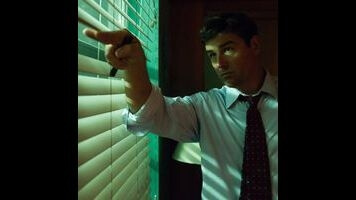In dramatic television, there’s a huge difference between “What happens next?” and “What happens now?” The first question is the building block of any compelling story, while the second implicitly indicts a drama built on a self-limiting premise that leaves it with a narrow path forward. The trio of creators behind Bloodline, Netflix’s family-with-secrets drama, answers the former question with the show’s second season, but the latter remains unsettled. Bloodline ambles and fumbles through a glacially paced story that feels frustratingly linear, especially coming from storytellers so well known for temporal trickery.
Before Bloodline, creators Todd Kessler, Glenn Kessler, and Daniel Zelman hatched Damages, the twisty legal thriller that won Glenn Close two Emmys even as it flailed in the ratings. Like their earlier show, Bloodline’s first season began in medias res, with John Rayburn (Kyle Chandler) dragging a body through a swamp in the pouring rain. “We’re not bad people,” says John in voiceover, “but we did a bad thing.” The people in question make up what’s left of the Rayburn family, which is to the upper Florida Keys as the Kennedys are to Hyannis Port, a family for whom privilege and tragedy are not mutually exclusive. The “bad thing” is conspiring to cover up the murder of Danny (Ben Mendelsohn), the Rayburns’ menacing black-sheep brother, who returned home to make his family pay for a decades-old betrayal.
The first season didn’t lean as heavily on flashbacks and flashforwards as did Damages throughout its five-season run, but the structure was key to its success. Bloodline’s slow-burn story takes time to build a head of steam, but the periodic flashes of the future remind the audience that the hows and whys of Danny’s death were the endgame. That story becomes bittersweet as Mendelsohn’s electric performance emerges as the show’s sharpest weapon. The Rayburns did a bad thing all right—they doomed future seasons of Bloodline by eliminating the character most likely to elevate any scene. The showrunners quickly quelled the audience’s fears by announcing Mendelsohn would remain part of the cast for season two, a story that would have as much utility for him as the first season did. As promised, Mendelsohn does return to Bloodline, but in a far less consequential role than he had in the first season.
Even after Danny dies—by his brother John’s hand in a fit of rage and desperation—he’s making life hell for his family. The other Rayburn siblings, Meg (Linda Cardellini) and Kevin (Norbert Leo Butz), unravel as the psychological weight of helping John cover up the murder bears down on them. Meanwhile, Rayburn matriarch Sally (Sissy Spacek) is the only one in the dark about what really happened to Danny, but suspects her children are holding back the whole truth. Unfortunately, season two is far more about the past than it is the present. Mendelsohn appears either as a ghost tormenting John, or in flashbacks that fill in the years Danny spent away from the family compound. Danny was such a disquieting presence, his absence is acutely felt even while the writers do everything in their power to tie everything back to him, including a hilarious plot contrivance that starts the season on a bum note.
Instead of flashing further into the future, season two picks up immediately where the first season left off, with John trying to maintain his sanity and get a read on Nolan (Owen Teague), the raven-haired troublemaker who suddenly emerged from the shadows to introduce himself as Danny’s son. Bloodline was initially buoyed by the Netflix binge-every-episode distribution model, but season two is hampered by it. Those who cranked through the first 13 episodes in a weekend may find their memories of the intricate plot—which also includes a drug kingpin and a human-trafficking operation—sorely lacking even after a “previously on” primer. Season two revels in those long-forgotten intricacies, making the second batch of 10 episodes a far less attractive binge-watching proposition. There’s no central mystery waiting to be solved, and without that element, Bloodline’s lackadaisical pacing becomes a crippling weakness. The episodes feel interminable, with some of them pushing past the hour-mark even as the story drifts in place.
Bloodline continues to boast one of the best ensembles on television, and the actors are as stellar as ever in the second season. John Leguizamo makes a fine addition to the cast as Ozzy, a violent former associate of Danny’s who lurks around corners making thinly veiled threats much as Danny did prior to his death. But Ozzy doesn’t feel like a clear and present danger as much as a proxy for a more interesting character with deeper roots in the story. Leguizamo is a live wire, but he can’t liven up a story that may have already run its course. There’s got to be a morning after, and Bloodline’s writers (now including novelist Dennis Lehane) deserve credit for drilling deep into the aftermath of Danny’s death. But the season feels like a dull, overlong epilogue, creeping along where it needs to be sprinting. If you think a slow-motion car crash is hard to watch, try watching the slow-motion clean-up.
Reviews by Kayla Kumari Upadhyaya will run every other day beginning Friday, May 27.

 Keep scrolling for more great stories.
Keep scrolling for more great stories.
